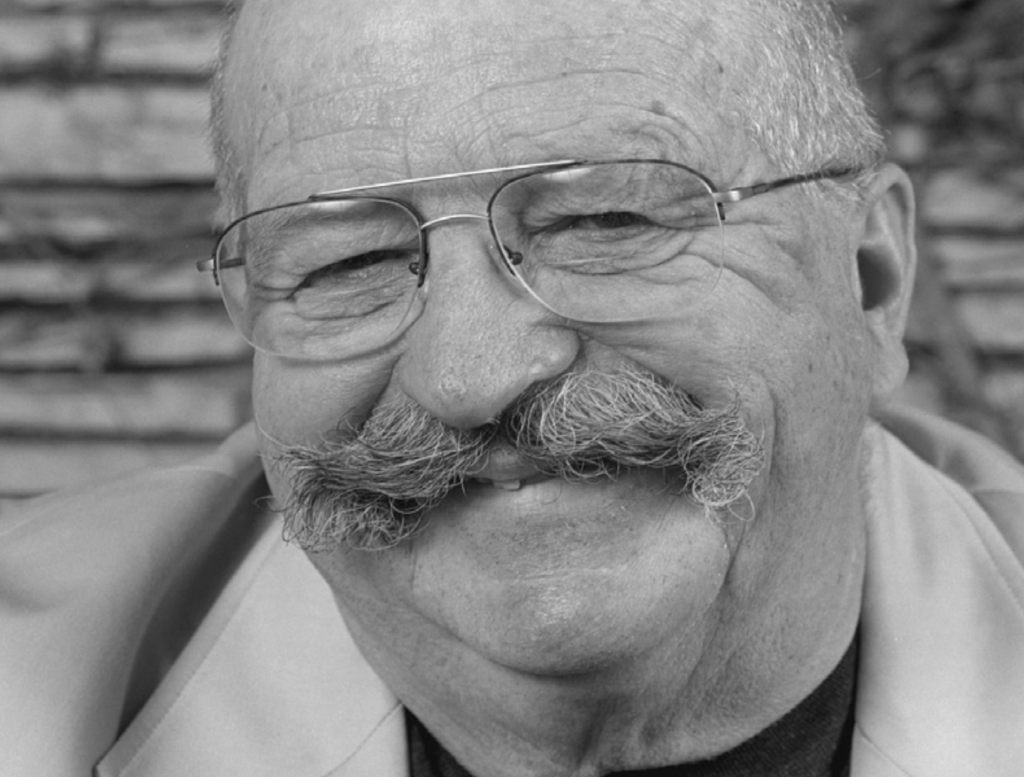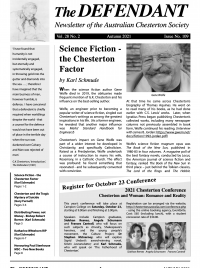When the science fiction author Gene Wolfe died in 2019, the obituaries made frequent mention of G.K. Chesterton and his influence on the best-selling author.
Wolfe, an engineer prior to becoming a popular writer of science fiction, singled out Chesterton’s writings as among the greatest inspirations in his life. (As a former engineer, he revealed that another major influence was Marks’ Standard Handbook for Engineers!)

Chesterton’s impact on Gene Wolfe was part of a wider interest he developed in Christianity, and specifically Catholicism. Raised as a Presbyterian, Wolfe undertook a course of instruction to marry his wife, Rosemary, in a Catholic church. The effect was profound: he found something that resonated – and he subsequently converted with conviction.
At that time he came across Chesterton’s biography of Thomas Aquinas. He went on to read many of his books, as he had done earlier with C.S. Lewis’ works. Later, when Ignatius Press began publishing Chesterton’s collected works, including many newspaper columns not previously assembled in book form, Wolfe continued his reading. (Interview with James B. Jordan )
Wolfe’s science fiction magnum opus was The Book of the New Sun, published in 1980-83 in four volumes. A magazine poll of the best fantasy novels, conducted by Locus, the American journal of science fiction and fantasy, ranked The Book of the New Sun in third place – just behind the Tolkien classics, The Lord of the Rings and The Hobbit.
In a New Yorker interview (April 24, 2015), Wolfe acknowledged the importance of his Catholic faith in his writing: “What is impossible is to keep it out,” he told the interviewer, Peter Bebergal.
Some critics have speculated that Severian, the narrator and main character of The Book of the New Sun, is a Christ-figure. He brings the New Sun and puts an end to the cruelty of torture. But Bebergal suggests that this religious comparison is not easy to make as “Wolfe wraps his Catholicism in strange language and cryptic images.”
Science fiction writers and Chesterton
The American medievalist and author, Sandra Miesel, has pointed out that Wolfe is not the only science writer who has been influenced by both Chesterton and Catholicism. In her article, “The Cross and the Stars” (Catholic World Report, May 15, 2011), she ponders the appeal which “speculative fiction” (SF), embracing both fantasy and science fiction, has exercised for various Catholic writers – and the extent to which some of them have been affected by Chesterton.
One example is the veteran science fiction writer, Fred Saberhagen (1930-2007), whom Miesel describes as a good storyteller steeped in traditional morality:
“In his career-making Berserker series, implacable robotic warfare attack all that lives, but are repelled in a battle modelled on Chesterton’s Lepanto and tamed by a St Francis figure.”
Fred Saberhagen
While noting the impact of Chesterton on Gene Wolfe, Miesel mentions the debt which three other science fiction authors owe to him. One is R.A. Lafferty (1914-2002), who, as “a self-educated man who spent most of his life in Oklahoma, lived and died as an unfashionably conservative Catholic.” Lafferty embodied an approach of dramatic realism reminiscent of Chesterton. Armed with “the high hilarity of love and laughter,” he once said, “we must kill the Devil afresh every day.”
Another writer who has acknowledged Chesterton’s inspiration is Tim Powers (1952 – ). In interviews in Science Fiction Studies (March 1988) and ignatiusinsight.com, he calls Chesterton’s Lepanto the “greatest poem in the English language,” which his mother “was always reciting.” “To this day, I can almost recite it by heart.”
A third author of science fiction conscious of Chesterton’s impact is John C. Wright (1961 – ). He published his first novel, The Golden Age, in 2002, and has said – again, in a
Chestertonian way – that he likes “large themes, thunder, fury, and wonder.”
In a website piece called “Just In Case You Have Not Read Chesterton”, he admits that he could not limit himself to one recommendation. He nominates various Chesterton books – novels, poetry, detective fiction, and Christian apologetics – highlighting, for example, The Man Who Was Thursday, which he describes “as odd as you can get without being actually science fiction”; The Ballad of the White Horse, “if your taste runs to epic poetry rather than to murder mysteries; and The Incredulity of Father Brown, “because nothing is better than a good murder mystery.”
Wright is a former lawyer who turned to science fiction writing. Formerly an atheist, he became a Catholic in 2008, describing his conversion as starting with philosophical arguments and being sealed by mystical experiences.
In his list of recommended Chesterton books, he picks out Orthodoxy, “because it is a lively and entertaining autobiographic look at the Christian faith, of interest to sceptics and believers alike (as I can personally attest, having read it as one, then as the other)”; and The Everlasting Man, “a masterpiece”.
Often mentioned as the most impressive modern work of science fiction by a Catholic is A Canticle for Leibowitz (1959). The author, Walter M. Miller Jr (1922-1996), had taken part in World War II in the bombing of the ancient monastery, Monte Cassino, founded in the 6th century by St Benedict. Miller’s act of reparation was A Canticle, the only novel he published in his lifetime. It is a post-apocalyptic story of an order of monks building a new abbey – and rebuilding a civilisation – following a nuclear holocaust. The distinguished poet and literary critic, Dana Gioia, has described A Canticle as “a classic of both science fiction and Catholic literature.” (The Catholic Writer Today, 2019)
The fictional world of modern fantasy and science fiction remains a pervasive feature of contemporary culture. Sandra Miesel is conscious of the ways in which it has challenged traditional religious faith, citing the “’scientific romances’ of H.G. Wells to the subversive tales of Philip Pullman.” But she is also aware of the extent to which Catholic authors have gravitated to this form of literature.
She highlights the importance of JRR Tolkien as “a sublime and faith-saturated writer.” The Lord of the Rings, she says, “ignited a demand for adult fantasy that still blazes bright,” and “transformed the market for its wares.”
